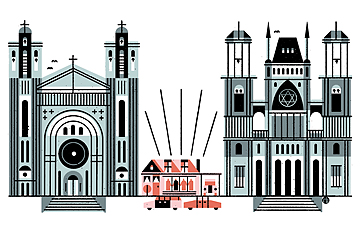
In the tiny coastal town of La Misin on Mexico's Baja peninsula, dozens of American expats meet for a Sunday gathering they call Not Church. Many of them long ago gave up on traditional religious institutions. But they function as a congregation often does--engaging one another in spiritual conversation and prayer, delivering food when someone is sick and working together to serve the poor.
On a recent Sunday the group, which began as a monthly discussion about a year ago, featured a sunny-haired ordained Presbyterian named Erin Dunigan delivering a sermon about tomatoes and God's call to Samuel. (Organized religion, she told them, can be like supermarket tomatoes--flavorless and tough. That isn't a reason to give up on religion, or tomatoes, but instead to find a fresh, local version worth cultivating.) "It was beautiful," Dunigan says. "The people who don't want anything to do with the church or religion were the people who were leading everyone else in the service."
These expats provide an example of a very American trend: turning away from organized religion and yet seeking rich if unorthodox ways to build spiritual lives. The fastest-growing religious group in the U.S. is the category of people who say they have no religious affiliation. Sometimes called "the nones" by social scientists, their numbers have more than doubled since 1990; major surveys put them at 16% of the population. But as the Not Church community shows, many of those who have given up on organized religion have not given up on faith. Only 4% of Americans identify as atheist or agnostic.
Diana Butler Bass's new book Christianity After Religion notes that the past decade has been particularly challenging for organized religion in the U.S., from the Catholic sex-abuse scandal to the entanglement of faith in heated political campaigns--resulting in a "sort of 'participation crash.'" Nearly every religious tradition has suffered. Even some megachurches, which pride themselves on marketing to people turned off by traditional religion, have floundered.
But the hunger for spiritual connection and community hasn't gone away. A 2009 survey by the Pew Forum on Religion & Public Life asked respondents whether they believed in God, how often they prayed and whether they were affiliated with a particular religion; it found that "40% of the unaffiliated people were fairly religious," says director Luis Lugo. "Many said they were still hoping to eventually find the right religious home."
That resonates with Dunigan, 40, who acts as a sort of unofficial chaplain for the Not Church members. "My sense is that for most, they're not rejecting God," she says. "They're rejecting organized religion as being rigid and dogmatic."
The U.S. has a long tradition of producing spiritual innovators and entrepreneurs. Today they're the organizers in the emergent-church movement, an effort by younger Christian leaders (there's a similar movement among Jews) to take religion away from musty pews and fierce theological fights by creating small worship communities that often meet in members' homes.
For traditional religious institutions, the challenge is how to adapt to this trend rather than fight it.
